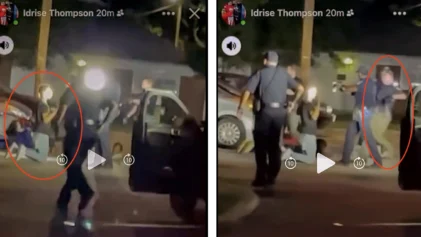Minneapolis police officers violated Andre Moore’s civil rights twice in a matter of months, a lawsuit obtained by the Atlanta Black Star alleges.
According to the lawsuit, officers pulled a gun and taser on Moore while he complied during a traffic stop and then beat him until he was unconscious in December 2019. After he filed complaints about the abuse, he was framed for drug charges by one of the officers involved. A judge later dropped the charges because they were based on the “reckless disregard for the truth.”
The lawsuit is one of several that depicts the department’s reported history of the disproportionate use of excessive force against Black people. Moore’s attorneys say he sustained a broken nose, multiple cuts, bruises, and abrasions to his face and body, among other injuries from the violent arrest. His eyes were almost swollen shut and his face was splattered with blood.

Moore was also held in jail for several months on the baseless charges. His bloody arrest was “egregious conduct” by the officers followed by “a premeditated act of revenge,” the lawsuit alleges.
Moore is seeking monetary damages for violation of his rights. The lawsuit alleges the five officers’ conduct robbed the man of his right to be free from unreasonable searches and “unnecessary and senseless violence at the hands of peace officers.”
Moore was dropping home a female friend who lived blocks away from his house on Dec. 7, 2019, when he was pulled over by Minneapolis Officer Tony Partyka and his partner. Partyka said in the report that he recognized Moore as someone with an outstanding arrest warrant, but no such warrant existed at the time, the lawsuit says.
The lawsuit alleges that when the officers approached Moore’s car, he placed his hands on the steering wheel. The officers wrote in the report that they could smell alcohol emanating from Moore’s vehicle and saw an empty container that they believed was used for alcohol.
They ordered Moore out of the vehicle, and when he tried to unfasten his seatbelt, he was accused of reaching for something, the lawsuit says.
Partyka pulled out his Taser and placed it on Moore’s chest, and threatened to stun him if he did not put his hands up. The lawsuit alleges that Moore attempted to comply with the orders several times and had not made any sudden or threatening movements.
Body-worn footage showed another officer, identified in the lawsuit as Dirk Spree, driving up to the scene and immediately running up, pulling a gun on Moore. As the officers threw the man to the ground, one grabbed a handful of his hair while another lambasted him with blows.
Moore posted the video on YouTube with the caption: “the night I could’ve died.”
“He’s grabbing something in his right arm,” one of the officers said.
“Stop! What are you doing?” The woman in the passenger side screamed.
“You’re going to get tased,” one officer said.
The woman continued to plead with officers as they piled on Moore, already on the ground.
“Stop removing. Stop resisting,” one officer repeatedly said as Moore moaned out, seemingly in pain.
The lawsuit said the man could not move because the officers had pressed their bodies on him, fully restraining him. The lawsuit alleges that Partyka elbowed Moore three times in the shoulder and then kneeled on his torso. Spee and a third officer also kneeled on Moore’s body, it says.
Moore’s right hand got stuck under him in the havoc, and the officers accused him of complying with the arrest, the complaint says.
Officer Neal Walsh held the man’s head against the pavement and kneed him three times in the face until he was unconscious. Then, an unnamed officer dragged a handcuffed Moore across the ground, according to the suit. Moore’s attorneys said no weapons nor alcoholic beverage were discovered, and the officers had no legal basis to search the car.
Moore had a .00 blood alcohol content level. He was hit with a misdemeanor obstruction charge that was later dismissed. Moore reported the incident to the police precinct twice, but he never heard back from authorities.
“On information and belief, both complaint forms were intentionally destroyed by the police before they were submitted for investigation,” the lawsuit alleges.
Partyka, a patrol officer, launched an investigation into Moore on Feb. 7, 2020, which he dubbed “Moore Money Moore Problems.”
On Feb.13, 2020, he requested a warrant under the pretense that he had received a tip from an informant that Moore had been dealing heroin and meth, the complaint says. Partyka used that a warrant to initiate a raid of Moore’s home where two pounds of meth and a firearm were reportedly discovered.
“We think that the confidential informant, in this case, may not have existed,” said Tanya Bishop, one of Moore’s public defenders, in an interview at the time.
Partyka further claimed that he had found two clear baggies with a white substance in an unmarked trash bin at Moore’s duplex that later tested positive for meth, the lawsuit says. He also alleged that he found a document, a one-gallon resealable bag with white powder and smaller bags in the same bin on another dump dive.
The paper Partyka allegedly found could also be printed from the jail roster through a “simple internet search,” the lawsuit contends.
Partyka’s case against Moore resulted in him being incarcerated for seven months because he was financially incapable of paying bail. However, the officer admitted during Moore’s suppression hearing that there was no white powder in the baggies during his second trash dig. He also could not provide the judge with a file on the alleged informant.
“Probably not coincidentally, the height and weight description allegedly provided by the ‘informant’ exactly matched the information on Moore’s driver’s license, which Partyka had access to as a result of his arrest of Moore three months before,” according to the lawsuit.
Hennepin County Judge Paul Scoggin said Partyka’s claims about the second discovery in the garbage were “made in reckless disregard for the truth,” and he did not have probable cause to do the search from the start.
Partyka’s decision to include the false allegations in his warrant application was “a material misrepresentation and, at a minimum, a reckless disregard for the truth,” Scoggin wrote.
The Star Tribune reports that Partyka has three open complaints and six filed against him that have been closed since 2019. He is also under an internal affairs investigation, however, the records are sealed away from the public, under law.


